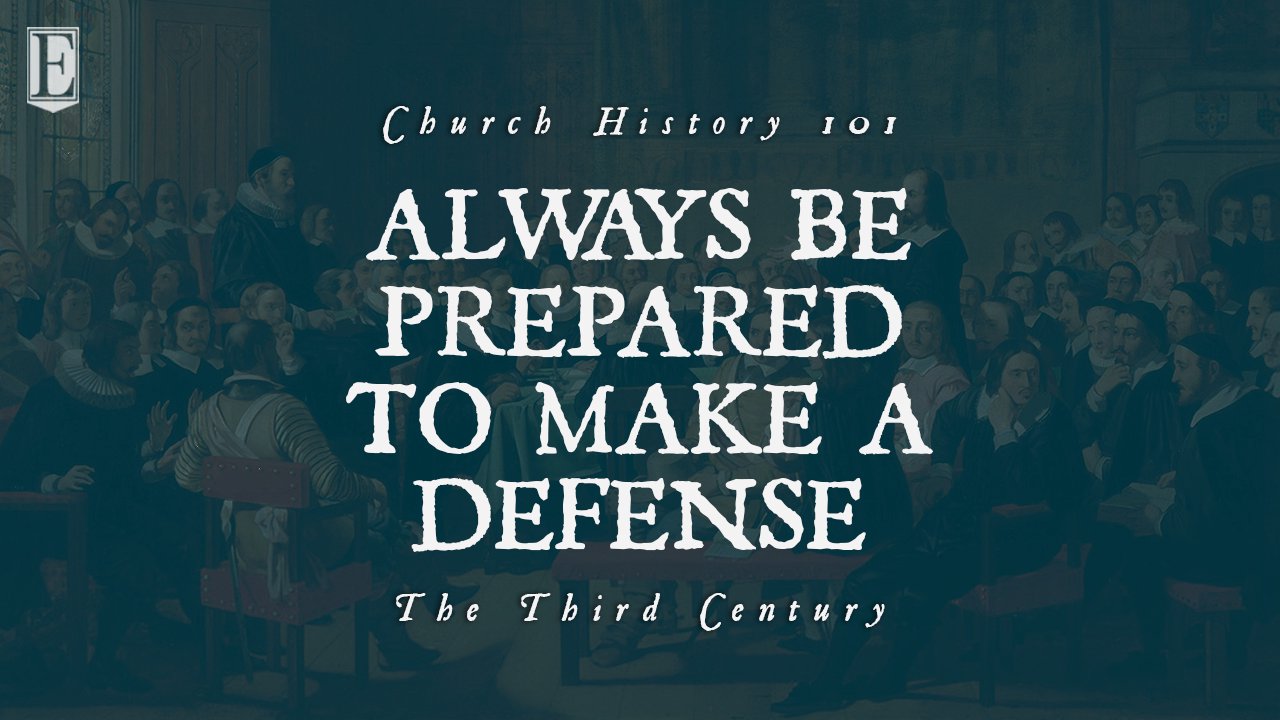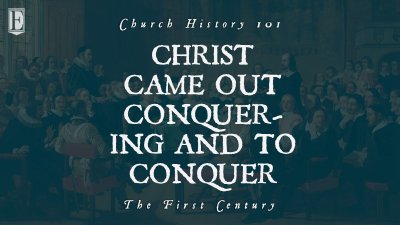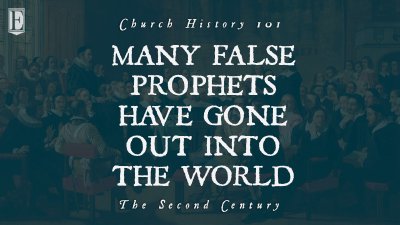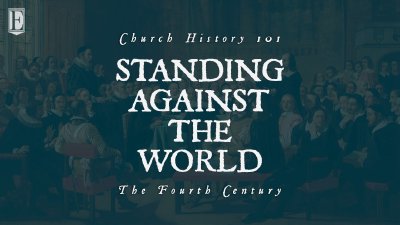Third century memory verse: “Always be prepared to make a defense” (1 Peter 3:15).
Third century memory quote: “We worship Unity in Trinity, and Trinity in Unity” (Tertullian, 155-220). *This means we worship one God who exists in three Persons, and we worship three Persons who exist in one God.
RECAP
Question I. What is church history? Answer. Church history is the story of how Jesus has built his church for his own glory and his peoples’ good. Jesus said, “I will build my church, and the gates of hell shall not prevail against it” (Matthew 16:18). Question II. Why should we learn church history? Answer. We should learn church history because it is the story of Jesus conquering the nations through his Gospel. “[Christ] came out conquering, and to conquer” (Revelation 6:2).
In the Second Century (i) The Church was attacked by persecution, and (ii) The Church was attacked by false teachers. Through these attacks the church remained faithful to Jesus.
Second century memory verse: “Beloved, do not believe every spirit, but test the spirits to see whether they are from God, for many false prophets have gone out into the world” (1 John 4:1).
Second century memory verse: “Let all persecutions come upon me, only let me enjoy my God” (Ignatius of Antioch).
THE THIRD CENTURY (A.D. 200-300)
I. THE CHURCH HAD TO SUFFER GREATLY BECAUSE THEY WANTED TO LIVE HOLY.“All who desire to live a godly life in Christ Christ will be persecuted (2 Timothy 3:12). Christians could not work certain jobs, because they desired to live holy lives. They could not take part in worshiping false gods. If they were builder they might have to be involved in building the walls of a false gods temple, someone who made clothes may have had to make them for the priest of an idol, someone who made incense may have had to make it for sacrifices to a false god. A Christian Bible-teacher named Tertullian even told Christians they should not be schoolteachers in the Roman Empire, because they had to use textbooks that told the ancient stories of the Roman false gods. The textbooks also told people they should worship idols. Even those who wanted to work in hospitals found that these places were controlled by those who worshipped demon gods, and the Christians could not do it. So they suffered.
However, the greatest reason they suffered is because they would not worship the Roman King Caesar as god. They would not say Kaiser Kyrios. They would only say Christos Kyrios. Because the Christians would not worship the false gods of Rome, the Roman citizens blamed Christians for all the bad things that happened. Tertullian said, “If [anything bad happens in the Roman Empire], at once the cry is raised: ‘Christians to the lion.’” The Christians suffered all these things because they wanted to live holy lives for Jesus. Because Jesus is worth it!
II. THE CHURCH ALSO HAD TO DEFEND THE TRUTHS OF THE BIBLE AGAINST HERETICS. “Always be prepared to make a defense” (1 Peter 3:15). A Heretic is someone who teaches things that deny the basic truths of the Bible, and the word heresy is a deviation from a basic teaching in the Bible.
In the Third Century, these Christians who defended the truths of the Bible were called The Apologists. The word apologist means defender. The Apologists of the Third Century defended the truth of the Bible against the heresy of Modalism. “Modalism teaches that there is one God who has appeared in different ways, or modes—as Father, Son, or Holy Spirit” (Sinclair Ferguson).
In contrast to the teaching of Modalism, the Apologists taught what the Scriptures teach about God being one in essence yet three Persons. The Baptist Catechism for Boys and Girls lists these three questions in a row, to help us understand our Triune God as faithfully taught in the Scriptures, and they should remind us of the Apologists against the Modalists in the Third Century:
Q6. Are there more gods than one?
A. There is only one God (Deut 6:4; Jer 10:10; Mk 12:29; Acts 17:22-31).
Q7. In how many persons does this one God exist?
A. In three persons (Mt 3:16, 17; In 5:23; 10:30; 14:9, 10; 15:26; 16:13-15; 1 In 5:20; Rv 1:4, 5).
Q8. Who are the persons of the Trinity?
A. The Father, the Son, and the Holy Spirit (Mt 28:19; 2 Cor 13:14; 1 Pet 1:2; Jude 20, 21).
CONCLUSION. Tertullian (155-220), the man who has already been quoted in this lesson, was from Carthage in the Country Tunisia, which is in Northern Africa. He was one of the Apologists in the third century. Tertullian fought against the heresy called Modalism and, as far as we know, was the first person in church history to use the word Trinity as it relates to the Godhead, Father, Son, and Holy Spirit. Tertullian said, “We worship Unity in Trinity, and Trinity in Unity.” This means we worship one God who exists in three Persons, and we worship three Persons who exist in one God.
Third century memory verse: “Always be prepared to make a defense” (1 Peter 3:15).
Third century memory quote: “We worship Unity in Trinity, and Trinity in Unity” (Tertullian, 155-220). This means we worship one God who exists in three Persons, and we worship three Persons who exist in one God.

ALWAYS BE PREPARED TO MAKE A DEFENSE: The Third Century
The Third Century
September 1, 2022 • Brett Baggett • 2 Timothy 3:12, Revelation 6:2, Matthew 16:18, 1 Peter 3:15
More from
Church History 101







